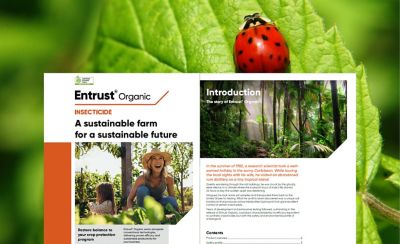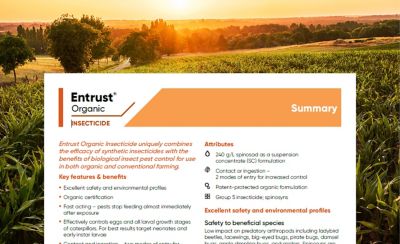
The switch to Integrated Pest Management (IPM) techniques in horticultural crops around Virginia, South Australia, has changed the type and frequency of chemicals used.
Agronomist Paul Pezzaniti. Of Platinum Ag, Virginia, said in the early days of pest control it was calendar spraying.
“Every seven days there would be something being applied.”
He said they went from calendar spraying to rotational spraying to the Integrated Pest Management programs being utilised today.
“Now we actually look at the pest closely and we determine - do we need to spray? If so, what spray do we choose that is going to have the least impact on our beneficials?”
Mr Pezzaniti said they had been working closely with Dr Paul Horne from IPM Technologies on what chemistry to use and what beneficial insects they should encourage or even purchase and release.
“We will also order some beneficial insects, predominantly Diadegma, which is a predatory wasp for the Diamondback larvae. The most important thing is to select a chemical that isn't going to knock out that beneficial but still help that beneficial get on top of the pest.”
He said there were a range of insecticides available, that were very targeted for the control of caterpillar pests and also pests, such as aphids and thrips, that could be used as part of the IPM program.

One of the newer options is Entrust Organic from Corteva Agriscience which is scheduled for release in 2020.
“We are looking forward to the release of the Entrust Organic which is going to have a better fit for the people who want to have a more effective IPM approach,” Mr Pezzaniti said. “It is hopefully going to have less impact on the beneficials and we feel it's also going to be really helpful in other Integrated Pest Management programs. With greenhouse crops, such as capsicums, cucumber and tomatoes, we can use it with minimal impact on our certain beneficials.
He said there were some organic growers in the area and the release of Entrust Organic will be a very good option.
“Entrust Organic is going to be the most effective insecticide in their portfolio which should make them far more successful.”
Mr Pezzaniti said one of the largest brassica growers in South Australia, T Mussolino and Co, were an enterprise that have adopted the IPM approach with great success.
“They've been practising Integrated Pest Management in their brassicas now for three years successfully.”
“Generally, when the pressure is high, we will introduce beneficial insects otherwise we allow them just to develop as they can by themselves, in the field.”
The winter crop of broccoli covered 50 acres and had not required an insecticide application right through until the initial harvest. It was only at this stage that eggs started to appear and a decision on an insecticide spray was made.
Mr Pezzaniti said approximately 60 to 70 per cent of growers in the district had adopted IPM techniques either wholly or in sections.
“I think the whole area has benefited from this because overall our pressure has decreased over the past few years."
“There are still a few growers that don't do any Integrated Pest Management and they just have conventional spraying. They will use broad spectrum insecticides such as organophosphates, and synthetic pyrethroids. I will visit their crops and I generally will find that they'll need a spray for aphids and their need to control of Diamondback moth is continual whereas in Integrated Pest Management, it may be short bursts and then they are back under control again.”
“People who are conventionally using broad spectrum insecticides are having to look over their shoulder all the time, whereas an Integrated Pest Management grower tends to gain control much quicker and is not as worried as a conventional grower."
He said growers needed to trust the person that is monitoring their crops and also needed to be involved in it themselves.
“If I'm out in the field and I see a pest there, I'll let them know where it's at and actually show them and take some photos. Then I have a follow-up visit after they have applied the suggested chemistry and telling them how successful they went. If you involve the grower with that and they can see how successful it is they are happy to continue.”

Most recent articles
- Yarra Valley growers switch away from old chemistry Agronomy • 28/5/2025
- New trial data confirms Utrisha® N’s role in boosting wheat yields in Australian conditions Agronomy • 7/5/2025
- Excellent performance of Powdery / Botrytis chemistry in table grapes Agronomy • 7/4/2025
- New fungicide option assisting sustainability goals at Banrock Station Agronomy • 27/3/2025
Additional Resources

Entrust Organic Qalcova active Insecticide
For the control of fruit flies infesting various tree, fruit, nut, vine and vegetable crops and ornamentals and on fly resting sites, including non-crop vegetation.
Product details
Entrust Organic - Tech Manual
Entrust Organic works alongside conventional technologies, delivering proven efficacy and sustainble productivity for your business.
View now
Entrust Organic Qalcova active Tech Summary
Entrust Organic uniquely combines the efficacy of synthetic insecticides with the benefits of biological insect pest control for use in both organic and conventional farming.
View now